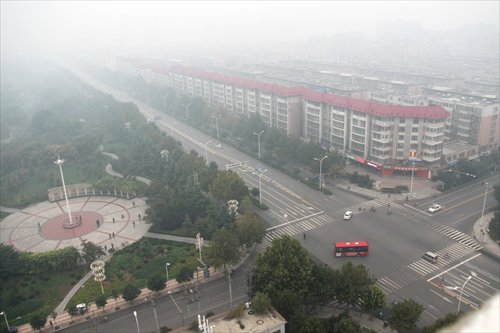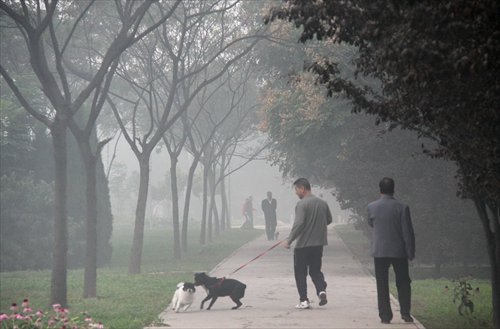‘Dirtiest city’ faces massive lay-offs while cleaning up air
Xingtai, Hebei Province has long been known as the "dirtiest city in China." The city, like many others in China, focused on developing heavy industry and is now choking with smog. In 2013, the provincial government issued an order to reduce steel production and clean up the air, but that caused unemployment and left the Xingtai government in debt. The city needs, but lacks, a long-term plan to completely clean up its air.

A hazy day in Xingtai, Hebei Province, on October 8. Photo: CFP
"The smog has come again," Li Zhong, a resident of Xingtai, Hebei Province, posted to WeChat on October 24. That day, Xingtai's air quality index measure of PM2.5 was a hazardous 500, officially "off the charts." Li said that he has almost forgotten what blue skies look like.
It was the third time that month that Xingtai had a day with hazardous levels of pollution.
For a long time, Xingtai has been called "the dirtiest city in China." Over the last few decades, the city has heavily relied on burning coal to support its massive steel industry and it is now paying the environmental price. Due to their proximity to Beijing, many cities in Hebei have started to try and clear away their smog by shutting down factories.
However, shutting down factories has caused unemployment and a reduction in taxes paid to the Xingtai local government, which is already in debt. Furthermore, the air quality problems cannot be solved simply through short-term measures and the government doesn't seem to have a long-term plan yet.
Starless nights
Li has lived in Xingtai for more than 10 years since he graduated from college. When he first came to the city, if he rode down the west second ring road on his bike he would see red smoke looming over the city. That smoke was pollution from Xingtai's many factories.
He has had to wash his car every day recently, the Oriental Morning Post reported. All the cars, buildings and people in Xingtai have been turned gray by the smog.
Chang, a retired tax bureau worker in Xingtai, said that he hasn't been able to see the stars for a long time.
A villager surnamed Su who lives near the Dongpang mining area in Xingtai told the Oriental Morning Post that he doesn't know whether his lungs have become black yet; he only knows that there's a field full of soot in front of his house and every time the wind blows, he "can't even open [his] eyes."
The "dust storms" come randomly, depending on the wind, Su said. They usually cover his entire cornfield with black powder. He has to sweep his courtyard twice a day to clean the soot away, his wife never hangs her clothes to dry outside and sometimes even their water turns black.
According to a report by the World Health Center in May on the average PM2.5 concentration in 190 cities around the world, Delhi was the worst city analyzed with an average of 153 micrograms per cubic meter. According to a report published by environmental NGO Greenpeace in July, the average density of PM2.5 from January to June in Xingtai was 152.6 micrograms per cubic meter.
Heavy pollution is so common in the city, most Xingtai residents don't think of the smog as bad weather, the Nandu Weekly reported. Only a few people wear masks on the streets, even on hazardously polluted days. An electronics store manager told the paper that not many people buy air purifiers either.
Xingtai has a long history of heavy, polluting industry. In 1956, a city planning office was established in Xingtai and it said that the city's industrial development should focus on "steel, mechanics, chemical engineering and textiles."
Because the city, like the rest of China, was in a hurry to develop quickly, many enterprises didn't have legitimate paperwork when they operated, Wang Dayong, secretary general of the Hebei Metallurgy Industry Association, told the Oriental Morning Post.
As the city expanded rapidly, industrial areas became enveloped by housing. According to data from the Xingtai Environmental Protection Bureau, within 25 kilometers of the city center, there are three power plants, four steel mills, two coking plants and more than 40 glass-manufacturing plants.

Xingtai Residents take a stroll in the park, braving the smog. Photo: CFP
Government measures
At the end of 2011, the government started a campaign to clean up Xingtai, headed by Wang Aimin, then secretary of the municipal Party committee.
At the time, Xingtai's media called the campaign an "environmental revolution." Media reports have claimed that within a few months, the local government removed more than 3.2 million square meters of trash from an area of 300 million square meters.
Last September, the Hebei provincial government issued an order stating that, by 2017, steel production in the province must be reduced by 60 million tons and that the amount of coal burnt must be reduced by 40 million tons.
A meeting was held immediately after the plan was announced, during which mayors from all of Hebei's cities, including Xingtai's mayor, signed a "responsibility contract" and were assigned a emission reduction target.
Xingtai's goal was to decrease the amount of PM2.5 in its air by 30 percent over five years.
The government encouraged the public to photograph any activity that was polluting the air. It also sent out 1,038 volunteers to companies to oversee their efforts and initiated a crackdown on polluting businesses.
Cheng Hua lost his factory due to the government's attempts to cut pollution.
Cheng used to own a small lime powder plant in northwest Xingtai, which made him about 1 million yuan ($160,000) of profit per year.
The factory employed people from surrounding villages and the locals could earn much higher wages than they could by farming, so even though the powder permeated the air when the wind blew, the villagers didn't complain much.
A week after the mayor's meeting, Cheng and other small factory owners received a notice from the government telling them to terminate production.
"There's no call for improvement measures […] the government just won't let you operate any more because it needs to clean up the air pollution," he told the Nandu Weekly.
At the same time, another Xingtai resident who ran an oil mill for 20 years, was told to shut down his business as well. He says that he can't make a living now.
"When it gets warmer, I'll find a part-time work outside Xingtai. There's nothing wrong with the government wanting to clean up the air, but they should let the people eat," he said.
Thousands of small plants were affected by this drive for clean air. The media has reported that by October 14, among the industrial plants in Xingtai, 1,813 had met emission reduction targets, 625 plants had gone bankrupt and 135 were forced to shut down because they didn't meet emission standards.
The Xingtai Iron and Steel Corporation, formerly a key part of the city's economy, has also come under pressure. To meet Hebei's targets, Xingtai needs to reduce its steel production by 4 million tons over the next five years and reduce the amount of coal burnt by 3 million tons.
Job half done
Even though these environmental measures have been applauded, the results have been questioned as well. Businesses being forced to close has created problems for Xingtai's workers.
Wang Dayong, the secretary general of the Hebei Metallurgy Industry Association, told the Oriental Morning Post that reducing steel production by 60 million tons will mean losing roughly 200,000 jobs.
The Dongpang Mining Company is already in crisis. A worker surnamed Zhang who has worked there for 30 years told the Oriental Morning Post that he now only makes around 2,000 yuan per month, half of what he made before these measures were introduced.
On the company's online forum, many workers discuss the issues around their salaries, clearly afraid this situation will not improve. Zhang said he knows that some mines have not been able pay their employees for a long time and that the workers demonstrated in front of government buildings.
Zhang Yingxing, the marketing director for the Hebei Metallurgy Industry Association, thinks that the solution to these problems is to bring new industries to the region which can provide financial support to the government, as well as employing workers that have lost their jobs in the steel industry.
Reports from Xingtai's government show that it is increasingly indebted. In 2012, its debt rose to 26.9 billion yuan. Its heavy industries, which were once big sources of tax revenue, have been struck a huge blow by the province-wide clean-up. Data shows that in 2014, local tax revenue was reduced by 530 million yuan.
On the other hand, the cleanup has not totally dispelled the smog and Xingtai still needs effective long-term measures to completely cure it of heavy pollution.
After consistently having the worst average air quality in China for six consecutive months, this July Xingtai's air quality finally became better than that of Tangshan, another industrial city in Hebei, moving up to second-to-last place. The Xingtai Environmental Protection Bureau applauded its achievement on its official website.
But on the day of that announcement, Xingtai's PM2.5 level was over 500 again. And on the day after. And on the day after that.
In September, Wang Aimin was placed under investigation, according to the Central Commission for Discipline Inspection of the CPC. As soon as he was removed from office, the cleanup began to peter out.
According to workers at the Xingtai Iron and Steel Corporation, the furnaces that were shut down by the company started operating again in September.
Oriental Morning Post - Nandu Weekly
Newspaper headline: No smog, no job?